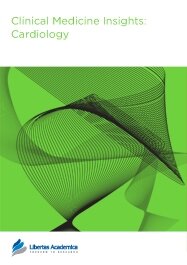

Publication Date: 05 Jan 2015
Type: Review
Journal: Clinical Medicine Insights: Cardiology
Citation: Clinical Medicine Insights: Cardiology 2014:Suppl. 1 39-44
doi: 10.4137/CMC.S15719

Transthyretin (TTR) amyloidosis causes heart failure from cardiac deposition of TTR amyloid fibrils, the by-product of TTR homotetramer disassembly. Wild-type (WT) TTR deposition leads to senile amyloidosis, predominantly manifesting with cardiomyopathy. Missense mutations in the TTR gene result in familial TTR amyloidosis. Certain mutations are more likely to affect the heart, while others cause more neurologic involvement. Extracellular fibril deposition triggers intracellular stress response, upregulation of the inflammatory cascades, apoptosis, and organ dysfunction. Recent studies suggest that TTR cardiac amyloid may be a significant contributor to the pathogenesis of heart failure with preserved ejection fraction (HFpEF). Summarized in this review are the molecular pathways underlying the cellular toxicity of TTR amyloid fibrils and the emerging therapies aimed at TTR tetramer stabilization, abrogation of TTR synthesis in the liver, or inhibition of amyloidogenesis.
PDF (1.08 MB PDF FORMAT)
RIS citation (ENDNOTE, REFERENCE MANAGER, PROCITE, REFWORKS)
BibTex citation (BIBDESK, LATEX)
XML
PMC HTML

I am impressed by the efficiency at each step of submission in the journal. Based on the first-hand experience, I am confident that this journal will have a great future, and the impact factor will rise rapidly.
Facebook Google+ Twitter
Pinterest Tumblr YouTube